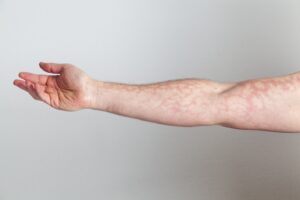How to Check for Poor Blood Circulation at Home
 How is your blood circulation? Left untreated, poor blood circulation can cause life-threatening complications. However, you can pay attention and notice the symptoms of poor circulation. Caught early, it can be effectively treated with lifestyle changes and a doctor’s care. So, what signs should you watch for if you’re concerned about poor blood circulation?
How is your blood circulation? Left untreated, poor blood circulation can cause life-threatening complications. However, you can pay attention and notice the symptoms of poor circulation. Caught early, it can be effectively treated with lifestyle changes and a doctor’s care. So, what signs should you watch for if you’re concerned about poor blood circulation?
- Numbness and tingling of the hands and feet are a common symptom of poor circulation. When blood flow is restricted and blood can’t efficiently reach the extremities, you might feel numbness, tingling, or a “pins and needles” sensation.
- Your hands and feet may feel cold. When blood flow to the hands and feet is insufficient, it can lead to temperature fluctuations that make the extremities feel much colder than the rest of the body.
- Swelling of the legs, ankles, and feet often indicates poor blood flow. Poor circulation sometimes causes fluid to accumulate in the tissues, particularly in the lower extremities. This condition is called edema, and it can be a sign of heart failure. You might notice edema when your clothing or jewelry begins to feel tight. You may experience a feeling of heaviness, skin that feels tight and warm, stiff joints, pain, and swollen skin that dents when you press on it.
- Poor circulation can impact your brain’s function. Cognitive issues that result from poor blood flow include memory loss and concentration problems. These can be the result of reduced blood flow to the brain, a shift in blood pressure, or a reduction in the blood pumping through the body.
- Digestion can be disrupted by poor blood flow. If you have digestive problems related to reduced blood flow, you may experience abdominal pain, diarrhea, bloody stools, constipation, and cramping.
- Your energy levels may be reduced by poor circulation. Additionally, poor circulation forces the heart to pump harder, which causes further fatigue.
- Inadequate blood circulation can cause pain in the joints and muscles. You may experience joint pain and muscle cramping, especially in the legs, feet, arms, and hands. Pain in your legs will often be worse after you’ve been sitting or standing for an extended period. One reason for this stiffness and cramping is that tissues in your body may be deprived of oxygen because of blood not circulating correctly.
- Sometimes your skin can change color because of insufficient circulation. When the amount of arterial blood that reaches the body’s tissues is inadequate, the skin can appear pale or blue. If the skin looks purple, blood may be leaking from the capillaries. Check the skin on your nose, lips, ears, nipples, hands, and feet and report any discoloration to your doctor.
- Ulcers in the legs and feet can be the result of poor circulation. These sores appear because the body’s ability to heal is impaired. They can also develop because of blood pooling in the veins of the legs and causing the skin to swell.
- Poor circulation can cause varicose veins to appear. Varicose veins look like knotted veins, and cause heaviness and aches in the legs, along with itchiness and swelling.
If you’re seeking the very best care for your vein and blood flow issues, trust the board-certified physicians at the Arizona Vein & Laser Institute. Using the most advanced technology, the vascular and cardiovascular surgeons at the Arizona Vein & Laser Institute provide care for all types of venous diseases. With over 40 years of experience, our team of experienced physicians can devise the right treatment plan to address your venous disease problems. For more information contact us through our website.
